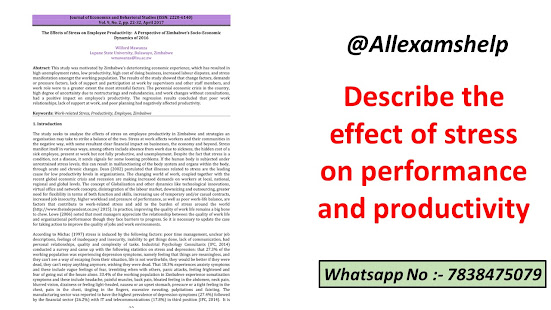Stress can have a significant effect on both performance and productivity. While some amount of stress can be beneficial, too much stress can be detrimental.
When
individuals are under stress, their bodies release hormones such as cortisol
and adrenaline, which trigger the "fight or flight" response. This
response can help individuals to react quickly in dangerous or threatening
situations, but it can also make it difficult to focus on tasks that require
concentration and attention.
Describe the effect of
stress on performance and productivity
Chronic stress
can lead to physical and emotional exhaustion, making it harder for individuals
to maintain their productivity over time. Additionally, stress can negatively
impact memory, decision-making abilities, and overall cognitive functioning,
all of which can have a negative effect on performance.
Stress can also
lead to negative emotions such as anxiety, irritability, and frustration, which
can make it harder for individuals to work collaboratively with others. This
can lead to decreased productivity, as communication and teamwork are essential
components of many workplace tasks.
Overall, stress
can have a significant impact on performance and productivity, making it
important for individuals to take steps to manage and reduce their stress
levels in order to perform at their best.
Performance and
productivity are two related but distinct concepts. Performance refers to the
level of accomplishment or effectiveness in carrying out a task, activity, or
job. It can be measured by the quality of work produced, the speed of
completing tasks, or the efficiency of resource utilization.
Productivity,
on the other hand, is a measure of how much output is generated from a given
amount of input. It can be measured in terms of the number of units produced,
the amount of revenue generated, or the level of profit earned. In essence,
productivity is about maximizing output while minimizing input.
While there is
some overlap between performance and productivity, they are not the same thing.
For example, an employee might have high performance in completing tasks, but
if the tasks are not contributing to the overall goals of the organization,
then productivity may be low. Similarly, an employee might be highly productive
in generating output, but if the quality of the output is poor, then
performance may be low.
In summary,
performance and productivity are both important measures of success, but they
measure different aspects of performance. A high-performing employee may not
necessarily be highly productive, and a highly productive employee may not
necessarily be high-performing. It is important to consider both aspects when
evaluating employee or organizational success.
Stress can have
a range of effects on the body, mind, and behavior. In short-term, stress can
actually be beneficial as it can help the body to respond to perceived threats
or danger by activating the "fight or flight" response. However,
prolonged or chronic stress can have negative effects, including:
Physical
effects: Chronic stress can lead to physical symptoms such as fatigue,
headaches, muscle tension, digestive problems, and weakened immune system.
Emotional
effects: Stress can also affect a person's emotions, causing feelings of
anxiety, irritability, anger, sadness, and depression.
Cognitive
effects: Prolonged stress can affect a person's cognitive abilities, leading to
problems with memory, attention, and decision-making.
For SOLVED PDF & Handwritten
WhatsApp No :- 7838475019
Behavioral
effects: Stress can affect a person's behavior, causing them to withdraw from
social situations, engage in unhealthy coping mechanisms like alcohol or drug
use, or exhibit unhealthy habits like overeating or under-eating.
Overall, the
effects of stress can be damaging to a person's physical, emotional, and mental
health. It is important to manage stress through healthy coping mechanisms such
as exercise, meditation, and seeking support from friends and family.
